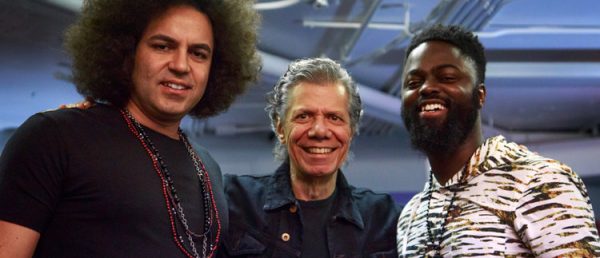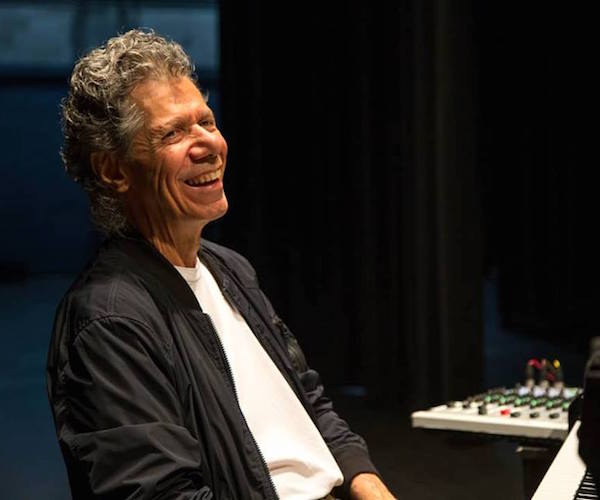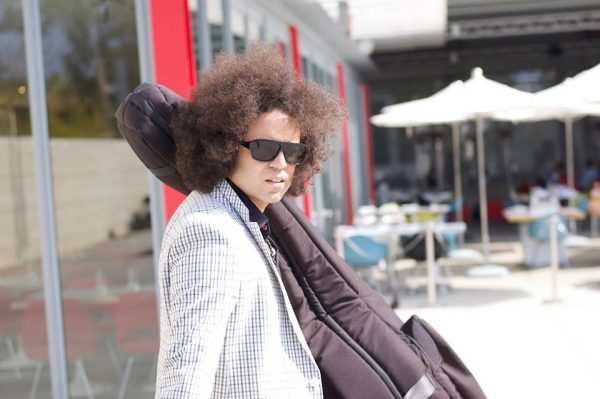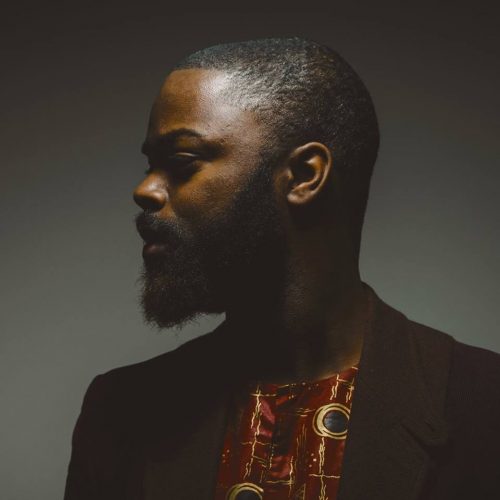Jazz Review: Chick Corea’s Vigilette Trio at Scullers
His beautiful sound is undimmed by time, his sensitivity to nuance is intact, and his choice of virtuoso partners was a delight.

The Vigilette Trio. Left to right: bassist Carlitos del Puerto, pianist Chick Corea, drummer Marcus Gilmore. Photo: courtesy of the artist.
By Steve Elman
The first time I saw Chick Corea in performance was in the late ’60s. As I remember, he was called in as a substitute for pianist Hank Jones for a quartet concert in Rochester, New York. He was in heavy company: the band was led by trumpeter Thad Jones and drummer Mel Lewis, and the group was rounded out by bassist Richard Davis.
Corea was only in his twenties at the time, and I had just barely heard of him, but I was impressed then with his technique, and especially with his command of block chords á la Red Garland. I also remember that his sound on the instrument was remarkable. I didn’t know at that time that he had been a student of Madame Margaret Chaloff, the Boston piano teacher who was a mentor to so many brilliant musicians – including Dick Twardzik, Keith Jarrett, Herbie Hancock, George Shearing, Toshiko Akiyoshi, Ken Werner, and Steve Kuhn – but I think Madame Chaloff’s influence must have been one of the factors that gave him a leg up in the competitive world of jazz in the ’60s.
(By the way, I wasn’t taking notes on concerts when I was in my teens. It is simply that Corea was already such a distinctive player then that I could not fail to remember him.)
More than fifty years have passed between that date and his residency at Scullers last week. Corea’s odyssey has taken him through many musical ports of call – his first sessions on LP as a leader in 1968 (Tones for Joan’s Bones, Vortex), his experiments with free music and Anthony Braxton in the cooperative band Circle, a career-milestone stint with Miles Davis’s electric band, the Brazilian-flavored Return to Forever group that got him his first big commercial success, his partnerships with A-list players including Gary Burton, his own Elektrik Band, and the increasingly frequent acoustic performances of recent years.
I love hearing him play the acoustic grand, and so I had to be there for two of his sets at Scullers. I’m pleased to report that his beautiful sound is undimmed by time, and his sensitivity to nuance is intact. There were even some moments when those Red Garland-style block chords made brief appearances. The repertoire was limited in the sets I heard, so I wish I could have heard a wider variety of tunes, but I was delighted in his choice of virtuoso partners and even happier to hear from the door personnel that the house was full for almost every one of his ten sets, from Wednesday at 8 to Sunday at 9.
May Scullers take that success as an invitation to invite more of the world’s greatest jazz players to give us residencies. We have too long been without the spiritual nourishment that comes from being in the company of Greatness.
About that piano sound, and the guidance of Madame Chaloff: one of the most articulate explanations of the Chaloff method and why it is especially useful to jazz pianists comes from Steve Kuhn (I draw this quote from “Steve Kuhn – Back in Focus,” by Steven A. Cerra, published on March 18, 2015): “You breathe as if you were playing a horn, from the diaphragm. You think of your fingertips as a reed and the keys as a mouthpiece. The sound comes out of you; it travels to the soundboard and out of the piano. It’s a complete flow that should not be broken . . . the sound travels up through the feet, the knees, the hips, the torso, through your shoulder and elbow, and out through the fingertips.”

Pianist Chick Corea — his beautiful sound is undimmed by time, and his sensitivity to nuance is intact. Photo: Facebook.
Another benefit of the Chaloff method is that it promotes equal strength in each digit, so that all the player’s notes ring out cleanly and with even volume, even in the fastest passages. On Friday night, I was seated close to the stage, almost over Corea’s shoulder, and I could see how well he has absorbed that technique and how effective it is in his hands.
During the course of the week, he chose tunes from nearly the entire range of his career. In a pre-gig interview by Ed Symkus in the Globe, he indicated that the repertoire would include his own compositions, standards, and jazz classics. And so it went at Scullers. (See More below for three set lists.)
For me, the only real repertoire disappointment was his selection of “In a Sentimental Mood” as representative of Duke Ellington’s contributions. It’s a great tune, I know, but there are so many less-well-known Ellington pieces that deserve more exposure – I imagine hearing Corea play “Warm Valley,” or “There Shall be No Night,” or “The Star-Crossed Lovers,” or “Isfahan.” Even “Mood Indigo” is becoming a neglected mastepiece these days.
By contrast, the 10 p.m. show on Thursday offered a very welcome wrinkle that I’m sorry I missed: Corea’s arrangement of a Domenico Scarlatti keyboard sonata that segued into Bud Powell’s “Tempus Fugit.” Leave it to pianist Donal Fox, who was there, to witness a classical-jazz fusion in the spirit of his own work.
I also would have loved to hear one of Corea’s very early originals, like “Litha,” written for his children Liana and Thad, or “Straight Up and Down,” a hard-blowing tune, but perhaps they go too far back. Fox reports that the trio revived a couple of familiar Corea classics on Thursday, “Armando’s Rhumba” and “500 Miles High,” which must have pleased the folks attending that show. On the other hand, he did not just offer his hits. By now he must be tired of playing his best-known tune, “Spain,” and so, in the sets I heard, he substituted a much more interesting composition with a similar Iberian flavor, Paco de Lucia’s “Zyryab.”
The ghosts of Thelonious Monk and Bill Evans also loomed large. Fox noted that “Monk’s Mood” and “Well You Needn’t” were part of Thursday’s late show, and I heard two performances of Sammy Fain’s “Alice in Wonderland,” which was core material for Evans.
But the Evans influence wasn’t limited to that one tune. Evans’s trio, captured for all time in landmark 1961 live performances that included “Alice,” made all previous combinations of piano, bass, and drums sound old fashioned. His group, completed by bassist Scott LaFaro and drummer Paul Motian, pioneered the conversational, intuitive interplay that was adopted by nearly every piano trio that followed. It’s still a vital tradition, typified by many recordings by Keith Jarrett and Brad Melhdau, and now by Corea’s Vigilette Trio.
The nature of this style requires a bassist and drummer who can listen deeply, think fast, and play at a virtuoso level. To fill those chairs, Corea has chosen well.

Bassist Carlitos del Puerto. A big sound and remarkable fluidity. Photo: Facebook.
Cuban-born bassist Carlitos del Puerto has a rich sound (maybe a bit boomier than it should have been, thanks to the room acoustics), remarkable fluidity, and a bell-like purity of tone. He has wit, too; his Friday solo on Corea’s “Fingerprints” quoted Deep Purple’s “Smoke on the Water,” and the Sunday one on the same tune snuck in a line from Dizzy Gillespie’s “Manteca.” There was only one moment when he sounded a little ill at ease – a short arco passage on Sunday night in his solo on “In a Sentimental Mood,” where his pitch wasn’t quite as sure as it had been in every other minute of both sets.
Drummer Marcus Gilmore, the grandson of percussion master Roy Haynes, is powerful in the way that nearly all modern drummers are, but he has the gift of taste, moderating volume when it’s called for by the feel of the music. He also has a tap-dancer’s grace as a soloist, and even “plays the changes,” suggesting the chords underpinning a chorus even when he isn’t accompanied by bass or piano.
But it’s important to note the almost obvious: Chick Corea is not Bill Evans.
For one thing, Corea likes to introduce little un-Evansish rhythmic punctuations into his arrangements which give a bit of shape to the improvisations. This has been a feature of his music for decades, and nearly every one of the tunes I heard had some variation on the theme. A particularly expressive example was the introduction of five staccato chords with some dissonance at the end of each chorus of “Alice in Wonderland,” a device that was repeated through each solo. This gave a very sweet tune a little tang and a nice dose of muscle.
Another area of difference is the overall emotional tone of Corea’s performances. Instead of Evans’s almost painful introspection and austerity, Corea offers gracious ease and heartfelt warmth. The flow of his ideas is just as fertile and graceful as Evans’s, but he invites the listener to enjoy his music – and his audiences respond to that generosity, encouraging him vocally within tunes and giving him standing ovations after each set . . . which is not exactly what listeners do at the usual club date.
From the smiles frequently passing across all three faces of the trio’s players, you can tell that this is a very congenial combination. There are just ten days or so left in their current tour, including extended runs in New York and San Francisco, after which Corea embarks on an international trip of solo recitals. But something tells me we’re going to get more chances to hear this band . . . the sooner the better, and hopefully with a bigger and more diverse book of tunes.

Drummer Marcus Gilmore. Power tempered by taste. Photo: Joao Gonzalez
More:
Chick Corea’s Vigilette Trio at Scullers, in the Boston DoubleTree Suites by Hilton: Corea (p), with Carlitos del Puerto (b) and Marcus Gilmore (dm), with guest artists as noted
Set list, Thursday September 20, 10 p.m show (with thanks to Donal Fox)
500 Miles High (Corea)
Monk’s Mood (Thelonious Monk)
Armando’s Rhumba (Corea)
Domenico Scarlatti: Sonata in G major, K. 146, L.34 / Tempus Fugit (Bud Powell) (arranged by Chick Corea)
(arranged by Corea)
All Blues (Miles Davis) with guest Ben Solomon (ts)
Well You Needn’t (Thelonious Monk) with guests Richard Stoltzman (cl) and Ben Solomon (ts)
Set list, Friday September 21, 8 p.m. show:
How Deep Is the Ocean (Irving Berlin)
Alice in Wonderland (Sammy Fain)
Zyryab (Paco de Lucia)
In a Sentimental Mood (Duke Ellington)
Fingerprints (Corea)
Set list, Sunday September 23, 7 p.m. show:
Mr. P. C. (John Coltrane)
Alice in Wonderland (Sammy Fain)
Zyryab (Paco de Lucia)
In a Sentimental Mood (Duke Ellington)
Fingerprints (Corea)
Vigilette Trio on tour:
Now through September 29, 2018 – Blue Note, NYC
October 1, 2018: The Birchmere, Alexandria, VA
October 3, 2018: Rio Theatre, Santa Cruz, CA
October 4 – 7, 2018: four-night stand at SF Jazz Center, San Francisco, CA
Chick Corea solo tour:
October 18 – November 29, 2018: solo piano tour of Japan, South Korea, Taiwan, India, Italy, Belgium, Czech Republic, Poland, Austria, France, and Switzerland (includes two duo-piano concerts with Makoto Ozone in Tokyo on October 24 and Osaka on October 25)
Tour itinerary from Corea’s website.
Steve Elman’s four decades (and counting) in New England public radio have included ten years as a jazz host in the 1970s, five years as a classical host in the 1980s, a short stint as senior producer of an arts magazine, thirteen years as assistant general manager of WBUR, and currently, on-call status as fill-in classical host on 99.5 WCRB since 2011. He was jazz and popular music editor of The Schwann Record and Tape Guides from 1973 to 1978 and wrote free-lance music and travel pieces for The Boston Globe and The Boston Phoenix from 1988 through 1991.

Thanks for the thorough review and comments. His mastery is undeniable. Massachusetts should cherish his local roots.